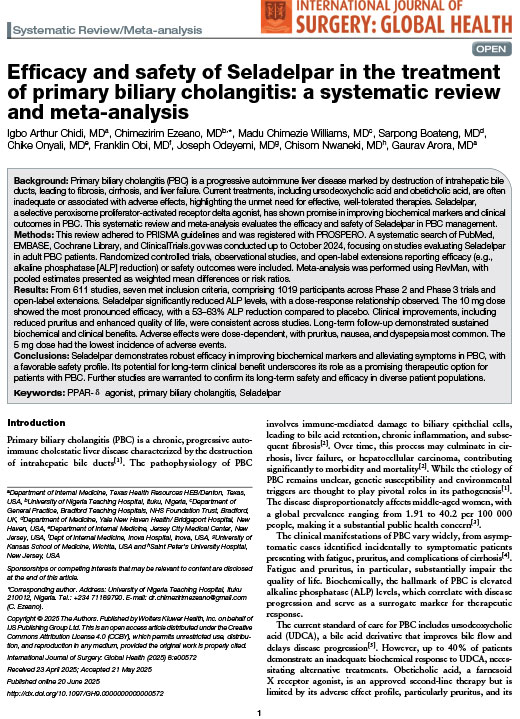Efficacy and safety of Seladelpar in the treatment of primary biliary cholangitis: a systematic review and meta-analysis
June 2025
Background: Primary biliary cholangitis (PBC) is a progressive autoimmune liver disease marked by destruction of intrahepatic bile ducts, leading to fibrosis, cirrhosis, and liver failure. Current treatments, including ursodeoxycholic acid and obeticholic acid, are often inadequate or associated with adverse effects, highlighting the unmet need for effective, well-tolerated therapies. Seladelpar, a selective peroxisome proliferator-activated receptor delta agonist, has shown promise in improving biochemical markers and clinical outcomes in PBC. This systematic review and meta-analysis evaluates the efficacy and safety of Seladelpar in PBC management.
Methods: This review adhered to PRISMA guidelines and was registered with PROSPERO. A systematic search of PubMed, EMBASE, Cochrane Library, and ClinicalTrials.gov was conducted up to October 2024, focusing on studies evaluating Seladelpar in adult PBC patients. Randomized controlled trials, observational studies, and open-label extensions reporting efficacy (e.g., alkaline phosphatase [ALP] reduction) or safety outcomes were included. Meta-analysis was performed using RevMan, with pooled estimates presented as weighted mean differences or risk ratios.
Results: From 611 studies, seven met inclusion criteria, comprising 1019 participants across Phase 2 and Phase 3 trials and open-label extensions. Seladelpar significantly reduced ALP levels, with a dose-response relationship observed. The 10 mg dose showed the most pronounced efficacy, with a 53–63% ALP reduction compared to placebo. Clinical improvements, including reduced pruritus and enhanced quality of life, were consistent across studies. Long-term follow-up demonstrated sustained biochemical and clinical benefits. Adverse effects were dose-dependent, with pruritus, nausea, and dyspepsia most common. The 5 mg dose had the lowest incidence of adverse events.
Conclusions: Seladelpar demonstrates robust efficacy in improving biochemical markers and alleviating symptoms in PBC, with a favorable safety profile. Its potential for long-term clinical benefit underscores its role as a promising therapeutic option for patients with PBC. Further studies are warranted to confirm its long-term safety and efficacy in diverse patient populations.
Keywords: PPAR-δ agonist, primary biliary cholangitis, Seladelpar
International Journal of Surgery - Copyright © 2025 The Authors. Published by Wolters Kluwer Health, Inc.on behalf of IJS Publishing Group Ltd.
Note: Obeticholic acid, marketed under the brand name Ocaliva® for the treatment of primary biliary cholangitis (PBC), was voluntarily withdrawn from the US market by Intercept Pharmaceuticals following a request from the US Food and Drug Administration (FDA) on 11/14/2025

